Police News

The complex business of Award negotiations
Kevin Morton p3 & 5


The complex business of Award negotiations
Kevin Morton p3 & 5




MANAGEMENT TEAM
Mr P. Gooley - Secretary
Mr P. Hannen - Asst. Sec. Organising
Ms K. Membreno - Asst. Sec. Industrial
Mr R. Del Vecchio - Asst. Sec. Admin
Mr A. Howell - Asst. Sec. Legal Services
Ms C. Prosser - EA and Events Coordinator
CPOB
Mr J. Goddard - Lead Organiser
Ms R. Neil - Senior Industrial Officer
Ms A. Reece - Industrial Officer MEMBER SUPPORT
Mr I. Johnstone - Member Support Coordinator

Mr. E Murphy - Member support officer TEAMS
CENTRAL METRO/SOUTHERN
Mr M. Evans - Organiser
Ms S. Minahan - Industrial Officer
Mr T. McGregor - Industrial Officer
NORTH WEST METRO/NORTHERN
Mr. G. Price - Organiser
Ms A. Fleming - Industrial Officer
Mr L. Solomon - Industrial Officer
SOUTH WEST METRO/WESTERN
Mr R. Sheraton - Organiser
Mr P. Richardson - Industrial Officer
Ms. C. Palma - Industrial Officer
NON LAC (SPECIALISTS)
Mr A. Stokes - Organiser
Ms. N. Lucaci - Organiser
Mr J. Ludkin - Organiser
Mr A. Boromisa - Industrial Officer
Mr G. Doyle - Industrial Officer
Ms K. Young - Industrial Officer
Ms E. Hampson - Industrial Officer LEGAL SERVICES
Ms K. Lally - Senior Coordinator
Ms E. Hagan - MET Officer
Ms C. Jones - MET Officer
Ms J. Whalebone - In House Counsel
Ms C. Young – Solicitor
Mr. B. Lee – Solicitor
Mr D. Longhurst - Solicitor
Ms B. Golledge - Senior Legal Clerk
Ms S. George - Paralegal
Ms B. O’Reilly - Clerk
Ms C. Crasto – Clerk
RELATIONSHIPS & STRATEGY
Mr T. Bear - Manager RESEARCH + COMMUNICATIONS
Mr A. Skinner - Engagement Manager
Dr K. Linklater - Research Officer
Ms E. King - Media + Comms Officer
Mr M. Rowland - Comms Officer
Ms K. Makhoul - Social Media
INFORMATION ORGANISING CENTRE
Ms K. O’Leary - Supervisor
Ms T. Fletcher
Ms N. Hawley
Ms K. Puckeridge
Mr H. Spiby
Ms. E. Guirguis
Ms C. Crasto
Ms A. Johnson - IOC
ADMINISTRATIVE SERVICES
Ms N. Scott - Supervisor Memberships
Ms J. Weber - Senior Admin Officer
Ms. C. Brett – Senior Admin Officer
Ms. T. King - Support Officer
Advertisers Alert: The Police Association of NSW is the publisher of PANSW Police News. The Police Association does not accept any responsibility to any advertiser or consumer in respect to advertising appearing in PANSW Police News. For enquiries re advertising in this publication, please contact the publishers via: elyssa.king@pansw.org.au


■ Executive Profile: Matt Webb p2
■ President's Message p3
■ First Link in the Chain: Concessional Cap p4-5
■ July 2024 Tax Cuts for Police Officers p6-7
■ Updates from the PANSW Industrial p8-9
■ Police Academy: Then & Now p11
■ NSWPF Relief Pool Trial p12-13
■ Two Branch Officials of the Year p14-16
■ Responding to Regional Crime p18-19
■ Your rights in the Workers Compensation system p20-21
■ Ride to Remember p23
■ Overview of ODS Round Three p25
■ Luke’s journey from the Police Station to the Classroom p26-27
■ Sydney's East gets a Police Memorial Wall p28-29
■ Mal Unicomb’s Wall to Wall Ride p30
■ Stick to Stadium: connecting indigenous kids with League p31
■ Podcast: Relief Pool / Superintendent Brendan Gorman p32
■ Mealbreak Crossword returns p33
CROSSWORD SOLUTION
DOWN / 1. EVERGREEN / 2. HERBICIDE / 3. ANNUAL / 4. FERTILISER 5. HOE / 8. NITROGEN / 10. HYDROPONIC / 11. BACKPACKERS 12. BEETROOT / 17. WEED / 19. GRAPES / 21. PRUNE / 22. IRRIGATION 23. CARROT / 25. LEGUMES / 27. SPRING / 28. DECIDUOUS / 29. SPINACH 31. MUSHROOM / ACROSS / 6. TOMATO / 7. VINE / 9. PERENNIAL / 13. TRELLIS 14. PESTICIDE / 15. MULCH / 16. COMPOST / 17. WHEELBARROW 18. GARDENING / 20. GREENHOUSE / 23. CROPS / 24. PERMACULTURE 26. SEED / 27. SEEDLINGS / 30. FLORA, / 32. MANURE / 33. GRAFT



Cover
The complex work of Award negotiations continues.

Disclaimer: Police Association of New South Wales (“Publisher”) advises that the contents of this publication are the sole discretion of the Police Association of New South Wales and the publication is offered for information purposes only. The publication has been formulated in good faith and the Publisher believes its contents to be accurate, however, the contents do not amount to a recommendation (either expressly or by implication) and should not be relied upon in lieu of specific professional advice. The Publisher disclaims all responsibility for any loss or damage which may be incurred by any reader relying upon the information contained in the publication whether that loss or damage is caused by any fault or negligence on the part of the publisher, its directors and employees. Copyright: All advertisements appearing in this publication are subject to copyright and may not be reproduced except with the consent of the owner of the copyright. Advertising: Advertisements in this journal are solicited from organisations and businesses on the understanding that no special considerations other than those normally accepted in respect of commercial dealings, will be given to any advertiser.



















■ When I transferred to Sutherland as a Sergeant in 2008, they did not have an active branch. Their first response was a shambles and many staff were unhappy. Having previously worked at places with strong branches, this inspired me to take on the role of Chair and recruit an active branch. Following that Executive Member Mick Aalders talked to me about Conference and I attended the region delegate meetings followed by my first Conference in 2010.
Following Jeff Budd’s retirement, after discussions with my fellow CPOB delegates, I decided to nominate to join the PANSW Executive. I had been on the CPOB since 2012 and had worked closely with Jeff. I had seen him work tirelessly building the relationship between the CPOB and non-commissioned regions. I didn’t want to let all his considerable efforts go to waste.
At Conference, I really enjoy the democratic process of debating the motions. It’s a chance for the delegates to see if they have the support of their peers. I’m sure some delegates at Conference
feel the CPOB debate everything, but it’s important to consider the bigger picture and potential implications of some motions. Seeing the organisations from a different angle allows this.
I think there are more challenges than opportunities facing us in the immediate future. The continued challenge of fixing the Concessional Cap which affects more and more members each year. Recruitment and retention continue to trouble the organisation; paying the recruits appears to have increased the upcoming class sizes and hopefully they will continue to maintain those levels. I think there are good opportunities with the proposed Award changes; removing the overlapping pay scales and the amount of incremental steps will be a huge win, as well as removing LSCs and paying an allowance to those who train Probationers is game changing, especially for General Duties.
The 75th Commissioned Officers dinner will be fantastic this year. PANSW staff Cath Prosser and Becc Neil work tirelessly to make it another great night. Like many
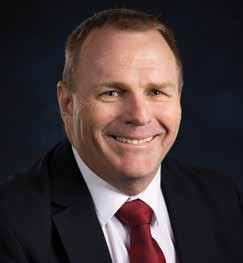
events, it’s a little later than planned courtesy of COVID, but we got there. The night has changed in recent years for the better, with the introduction of partners, who can be non-commissioned or civilian, which has taken some of the stuffiness and ego out of the room.
PANSW President Kevin Morton
■ For more than a decade, the PANSW has campaigned to resolve the PBRI Concessional Cap issue. An issue that has impacted many and made it increasingly difficult to save for your retirement.
At minutes to midnight before the end of the financial year, the Federal Government committed to temporary financial assistance for NSW police officers. This comes in the form of a single lump sum payment to eligible low to middle income officers who exceed the Concessional Cap. This will compensate those officers for the reduced eligibility of Commonwealth means tested benefits due to the impact of the PBRI scheme.
As is the case with many long-fought campaigns, a feeling of disappointment outweighs any sense of success when our members continue to get Concessional Cap bills this year. There is also no denying that many members, including those who were championing this issue, will not be positively impacted by this Federal Government outcome. Your commitment to the cause has meant that there are many others that will benefit through the single lump sum payment.
Our progress hasn’t been smooth but we continue to move forward. This is the roughly cut stepping stone that will pave the path to a permanent solution. This is a pivotal moment of resolution and action when previous State and Federal Governments remained unmoved by our plight and ongoing calls for change. Commonwealth Assistant Treasurer Stephen Jones engaged on this issue. We thank NSW Premier Chris Minns, Minister for Police and Counter-terrorism Yasmin Catley and Commissioner Karen Webb and her Executive for their contributions to advancing this outcome. Now, we focus our efforts on working with the NSWPF on that long-term solution to resolve the issue for all
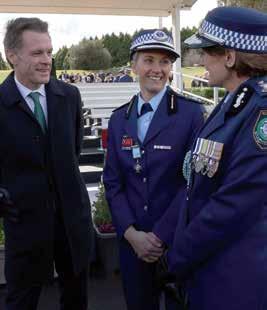
members. This extensive body of work is already underway and will be incorporated into the 2024 Award MOU.
At the time of writing, your negotiating team remains deep in discussions with the NSWPF and the State Government in relation to the 2024 Award. The PBRI arrangements remain an important inclusion in this process and will be maintained.
Our position hasn’t changed. 25% across all ranks, including compressed pay scales and allowances to reward experienced officers training our new recruits. By the time this reaches you, we will no doubt have more to say – but at the current point in time an offer hasn’t been made from the NSWPF for your Executive to consider. Once an offer has been made, the Executive will decide whether to put it to you, the membership, for a vote. Detailed instructions on the voting process have been sent to your nominated email address.
At our Biennial Conference in May, Premier Minns committed to backdating
any pay rise awarded to police officers to July 1 when an agreement is reached. This is a heartening prospect during the protracted process of these negotiations. As these discussions continue without prejudice, scenarios are able to be tested and mutual gains identified.
It is always special to return to the NSW Police Force Academy. As a Goulburn native, the chill on the parade ground always has that special reminder of home in the heart of Winter.
The latest attestation was particularly memorable. The first class of paid recruits were welcomed, with 169 probationary constables from Class 362 welcomed to the ranks of the NSWPF.
On this day, Inspector Amy Scott was recognised with the Commissioner's Valour Award. I have no doubt many of the probationary constables present will be looking to her as an example of leadership and bravery. I couldn’t have been prouder of how she spoke and used the opportunity to thank her team and all the other frontline responders who assisted. It was an important reminder of the significance of the work that each and every one of you perform, day in and day out, to keep our communities safe.
As Executive Member Peter Gurr will outline in the pages ahead, the Academy has also undergone significant changes in infrastructure, education and training in order to ensure that it continues to produce professional police officers ready to serve and protect from their first day on the job.
I hope that we continue to see a boost in class numbers producing the police officers of tomorrow to support our currently serving officers who continue to work tirelessly.

Kevin Morton PANSW President
■ For 12 years, the PANSW has never given up the fight to resolve the PBRI concessional cap issue with the State and Federal Governments which affects almost every member including myself and the Executive. This issue arose in 2011 when the NSW Liberal/National Government enforced wholesale changes to the scheme, washing the premiums through superannuation. This was in the face of strong opposition by police officers across the State. This has been a long hard fought campaign involving thousands of members coming together to advocate for change.
On Friday 28 June, I announced that the Federal Government had committed temporary financial assistance to NSW Police officers regarding taxation on excess concessional cap contributions. The PANSW would like to thank Premier Chris Minns, Minister for Police and Counter-terrorism Yasmin Catley along with Commissioner Karen Webb and her Executive team for assisting in advancing this outcome.
Firstly, the current reimbursement arrangements when you exceed the concessional cap will continue in its current form for any affected member. Additionally, the Commonwealth assistance being announced includes:
• Continuing to reimburse officers for tax on voluntary superannuation contributions that exceeds the concessional cap due to insurance premiums being paid through superannuation and;
• Providing a single lump sum payment to eligible low – middle- income officers (those with an adjusted taxable income up to $135,000) who exceed the concessional cap. This will compensate serving officers for the reduced eligibility of Commonwealth means tested payments due to the impact of the PBRI scheme.
• The cost of payments would be covered solely by the Commonwealth.
• Support would cover low-middleincome officers who exceeded the
concessional contributions cap and can choose support in either 2023/2024 or 2024/2025 (provided their adjusted taxable income in the relevant year is below the threshold). Officers would be limited to a single payment regardless of whether they were eligible in both years.
The single payment would be made up of:
• A $1,500 after tax payment for all eligible officers; and
• A $1,000 after tax payment for eligible officers with one or more children in childcare.
• The income test will apply to officers alone, it will not include income of their partners as is normally the case for the Commonwealth means tested support. PANSW is continuing to work with NSWPF on a long-term solution. This is a large piece of work that is actively underway and will be incorporated in the 2024 Award MoU.
For FY 24/25, as part of the Award negotiations, the PANSW is working towards police officers in NSW being able to:
• properly record their actual income earned, not an inflated amount adversely impacting on means-tested Government benefits
• be able to contribute to their superannuation and their retirement with a concessional cap limit of $30,000 which has been increased from $27,500
• be able to access future unused concessional cap amounts
Over the last 12 years we have seen inaction from the State Government that implemented this scheme and broken promises from the former Federal Government. Commonwealth Assistant Treasurer Stephen Jones MP engaged around this issue. Whilst it has taken some time to resolve, he has put an end to this issue for police in NSW and for that he is thanked.
Your Award negotiating team remains in deep negotiations over the Award with NSWPF and the NSW Government.
The PBRI arrangements form a crucial inclusion in the Award MOU, and 2024 will be no different to ensure that the benefits remain guaranteed for the term of the Award.
We have not changed our position; this Award needs to show our members respect and help retain them. Our position is still 25% across all ranks, removing overlapping pay scales, compressing pay scales and rewarding those officers who train our newest officers in the Force. We continue to work around all these issues, but it is important for members to know we have not received a formal offer from NSWPF at this stage for the Executive to consider sending to the membership for a vote. At the time of writing, we are now in the last week of this current Award. Most importantly, Premier Minns at the recent PANSW Biennial Conference confirmed his commitment to backdate the pay rise awarded to police officers to 1 July 2024 when agreement is reached. So, any offer received irrespective of the timing of that offer will be guaranteed to be backdated to all members like it was signed and delivered by July 1. Secondly as we negotiate, our current award conditions remain as the status quo, nothing changes with your entitlements as we continue to negotiate the new award.
Keep up the great work you are all doing out there, we know you are short staffed and busy which has been at the forefront of the negotiations with the focus on retention of police officers. Your continued outstanding efforts empower us and are not lost during the negotiations I can assure you. Without prejudice negotiations are confidential to allow the identification of mutual gains and the rigorous testing of scenarios. When we have information that can be distributed to members in these negotiations we will communicate as such.
This announcement is the first link in the chain ensuring you are properly rewarded for your sacrifice, and we can attract and retain the dedicated people this State needs to do this job.

Kirsty Membreno PANSW Assistant Secretary – Industrial
The Australian Government has made changes to individual income tax rates and thresholds. This will apply to all taxable income you earn from 1 July 2024. It is important to note that the changes will not impact your 2023–24 tax return.
From 1 July this year, these changes will:
• reduce the 19 per cent tax rate to 16 per cent
• reduce the 32.5 per cent tax rate to 30 per cent
• increase the 37 per cent tax threshold from $120,000 to $135,000
• increase the 45 per cent tax threshold from $180,000 to $190,000.
These changes will deliver a tax cut to every Australian taxpayer.
New individual tax rates and thresholds for 2024–25
This table compares the individual income tax rates and thresholds for 2023–24 with the new tax rates and thresholds for 2024–25.
0
45,001 – 120,000
120,001 – 180,000
Over 180,000
Thresholds in 2024–25 ($)
0 – 18,200
18,201 – 45,000
45,001 – 135,000
135,001 – 190,000
Over 190,000
New individual income tax rates and thresholds will come into effect from 1 July 2024. If you are an Australian taxpayer, you are entitled to the tax-free threshold of $18,200. This means you can earn up to $18,200 each year without paying tax.
If you earn between $18,201 and $45,000:
• your first $18,200 remains tax free, and
• you will pay 16 cents tax on every dollar you earn between $18,201 and $45,000.
If you earn between $45,001 and $135,000:
• your first $18,200 remains tax free, and
• you will pay 16 cents tax on every dollar you earn between $18,201 and $45,000, plus
• 30 cents tax on every dollar you earn between $45,001 and $135,000.
If you earn between $135,001 and $190,000:
• your first $18,200 remains tax free, and
• you will pay 16 cents tax on every dollar you earn between $18,201 and $45,000, plus
• 30 cents tax on every dollar you earn between $45,001 and $135,000, plus
• 37 cents tax on every dollar you earn between $135,001 and $190,000.
If you earn over $190,000:
• your first $18,200 remains tax free; and
• you will pay 16 cents tax on every dollar you earn between $18,201 and $45,000, plus
• 30 cents tax on every dollar you earn between $45,001 and $135,000, plus
• 37 cents tax on every dollar you earn between $135,001 and $190,000, plus
• 45 cents tax on every dollar you earn above the $190,000 threshold.
How does this benefit members?
Examples from 1 July 2024 (based on June 2024 salary rates without any % pay increase applied):
• Senior Constable Level 3 on $107,664 will see a $2371 tax cut
• Sergeant 7th Year on $136,887 will see a $3729 tax cut
• Probationary Constable on $81,517 will see a $1717 tax cut
• Inspector Year 2 on $161,198 will see a $3729 tax cut
# the information contained within this article is sourced from taxcuts.gov.au
about superannuation?
From 1 July 2024 the superannuation concessional cap increases from $27,500 to $30,000 for each person meaning officers can contribute more into their superannuation accounts pre-tax to save for their retirements.
Further, from 1 July 2024, the employer superannuation guarantee contribution increases from 11% to 11.5% of salary for each officer.
If you have unused cap amounts from previous years, you may be able to carry them forward to increase your contribution caps in later years, appreciating that police officers in NSW may have used much of their cap due to the PBRI concessional cap issue which is being resolved for FY 24/25 and beyond.
Kirsty Membreno PANSW Assistant Secretary – Industrial
A quick summary of recent enquiries and disputes
■ It has been a busy time for the team with many industrial disputes on behalf of Branches and individuals progressing through the Dispute Avoidance process prescribed by the Crown Employees (Police Officers 2021) Award (the Award). Some of those key active industrial disputes on foot at present include:
The PANSW has been in contact with every officer promoted to a Senior Sergeant position since April 2023 who dropped salary upon being promoted from Sergeant to Senior Sergeant. From 2014 to 2023, all Senior Sergeants promoted did not take a pay cut and their existing salary was honoured at time of promotion based on the Business Rules relating to Senior Sergeant appointments. Without consultation, NSWPF made the decision to alter the Senior Sergeant Business Rules in late 2022 to appoint Senior Sergeants to Year 1 salary, resulting in a salary reduction for many officers being promoted to the higher rank. We believe that this is a breach of the Award, custom and practice and is an extra claim by the NSWPF during a no further claims period of the Award.
On behalf of every affected Senior Sergeant (those who were previously Sgt level 9 prior to promotion), the PANSW has escalated a dispute to the NSWPF PCC to resolve. Despite initial intentions of the NSWPF to rectify this anomaly, they have so far refused to pay these officers the salary they are entitled to from date of appointment. The PANSW will continue to pursue this on behalf of the affected officers. If you are an affected Senior Sergeant and have not been in contact with the PANSW, please do so immediately to discuss your circumstances.
On behalf of several members, the PANSW has lodged an industrial dispute in the Industrial Relations Commission of NSW (IRC) in relation to the treatment of their increment being delayed during the first 3 years of employment. Each of these officers through no fault of their own had their confirmation delayed and as such their increment date has been impacted from that point onwards. There is a clause within the Award that provides for any delays within the first 3 years of employment to enable the maintenance of what would have been their original increment date. NSWPF and PANSW have participated in conciliation to resolve the dispute in the IRC which has unfortunately been unsuccessful with the NSWPF refusing to conciliate the matter. The PANSW will now be seeking to resolve the interpretation of the Award Clause via the newly created Industrial Court. Members will be updated further as this dispute unfolds.
We have recently been fielding enquiries across the State about roster changes due to officers being rostered to work a longer shift than normal, with the officer then being rostered to perform a shorter shift in the future of a current roster cycle, therefore avoiding an overtime payment to the officer who has worked more than their normal shift length hours. AC Smith from PCC, has provided instructions to Commanders on 22/12/23 regarding this practice:
“Where required, an officer’s roster may be altered in consultation between the
officer/Commander to ensure 228 hours is maintained for that roster cycle.
Where there is a need for the officer to maintain their usual shift length within their substantive duty type (e.g. 9.5hours) due to operational requirements, overtime may be paid in circumstances where an officer works in excess of 228 hours across the roster cycle.”
The PANSW agrees with the above instructions from PCC and has been advising Commanders/Managers of this practice where required. We have had some occurrences of members not in receipt of their entitlement escalated to NSWPF Industrial for review.
As per clause 19 of the Flexible Rostering Guidelines (FRG), changing shifts for the purposes of overtime calculations can only be done with mutual agreement.
Clause 19 asserts that:
19. Change of Roster …
A “shift” for the purposes of calculation of the overtime rate in this clause means the usual length of shift worked on that day by officers rostered for the same or similar duty. By mutual agreement however, an officer may work a full shift of a lesser number of hours consistent with the length of shifts worked within the particular flexible roster to a minimum of six (6) hours.”
To confirm, if the officer consents and agrees to a shorter shift, there is no issue, however this mutual agreement needs to be obtained first in order to alter the officers usual rostered shifts. If agreement is not forthcoming from the officer, overtime is payable for the time worked in excess of usual rostered shift (ie 9.5 to 12 hours = 2 hours O/T at 1 ½ rate) and the remaining shifts in that week remain as per the usual flexible roster that exists.
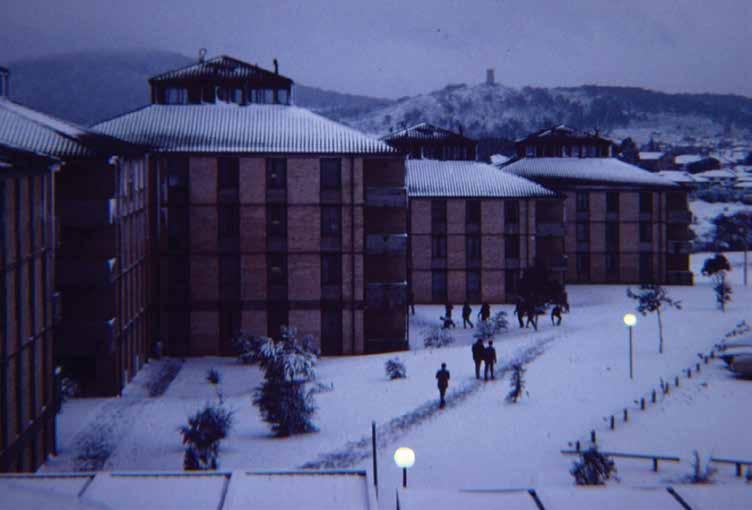
PANSW has received a number of enquiries regarding the standards of accommodation provided to seconded weapons instructors when teaching at the Academy.
Clause 10.2 of the Crown Employees (Police Officers - 2021) Award sets out that officers travelling on official business should receive three-star standard accommodation:
10.2 Where available at a particular centre or location, the overnight accommodation to be occupied by officers who travel on official business will be the middle of the range standard, referred to generally as threestar or three-diamond standard of accommodation.
The Academy has a number of motel style rooms which would meet this requirement. However, this accommodation is often unavailable.
Members are often being accommodate in the residential towers with a shared
bathroom which would not meet the definition of a three-star standard.
PANSW has made representations to NSWPF about this issue and advised if the 3 star standard cannot be provided, alternative 3 star accommodation should be provided or officers compensated for any substandard accommodation via the Special Operations Allowance which should be applicable when in dormitory style accommodation.
We currently await a response from NSWPF.
A dispute was raised in early 2023 when PANSW became aware that a specialist Command had commenced advertising LSC positions in a contrary manner to the LSC Guidelines which dictates advertising LSC positions should be ‘location’ based. In September 2023, after numerous months of negotiation, during which time LSC recruitment was placed on hold, NSWPF and PANSW reached an agreed dispute outcome of a trial 6 month period
of ‘sector’ based recruitment. However, as part of the agreement, 10 nominated locations had the opportunity to have one final ‘location’ based recruitment of LSC prior to the change of a ‘sector’ based approach. Regional areas (except Central Coast, Lake Illawarra and Riverina) remained location based due to their geographical obstacles.
During this time the PANSW continued to closely monitor the recruitment of LSC vacancies across the Command and raised our concerns on numerous occasions about the continued non filling of LSC vacancies throughout the 6 month trial period both at a local level, AC level and PCC level. Unfortunately, the non-filling of LSC positions continued. As such on the 7 June 2024 a formal dispute was lodged in the IRC to have this dispute resolved with the assistance of the IRC. A recommendation by the IRC Commissioner was issued to the parties on 19 June 2024 requiring NSWPF to advertise the LSC vacancies. Further IRC report back dates are scheduled to monitor this resolution.
Root canal, simple and surgical extractions and periodontic treatment are covered under General Dental, with no annual limit*, rather than Major Dental like most other funds. This means your Major Dental category isn’t exhausted by these services and is available if you need more complex dental services.


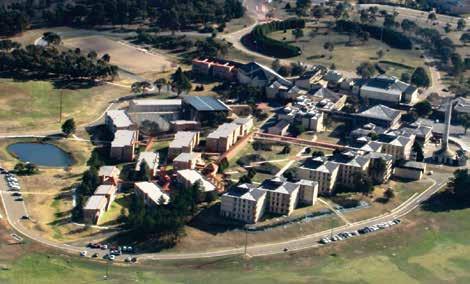
■ A little over 20 years ago, I was a bright-eyed student police officer at the NSW Police Academy striving to become a member of the NSW Police Force. Back then, Rossiville had one house where all the DV occurred, a park, and a few other generic buildings. Come to think of it, there wasn’t even a police station! Weapons training was conducted at the indoor range, demountable buildings, or B building and PT consisted of dodging the rabbit holes on the oval. Study for a student was all face to face and paper based with limited flexibility and at your own expense. The accommodation was in the towers, and one may consider it spartan at best. I reflect on these memories fondly and have made lifelong friends because of my career choice.
Fast forward twenty years and the transformation is astounding. Rossiville now has a fully functional police station, with an updated transport interchange and refurbished shopping precinct. Students now get paid to train, with the NSWPF welcoming 169 new probationary constables when Class 362 attested on Friday 21 June. The old towers are currently undergoing renovations and new accommodations facilities have been built. The curriculum has transformed to a blended flexibility multi-model of online and face to face delivery systems.
Technology has made a significant impact on curriculum delivery and has provided opportunities and pathways
for students that did not exist previously. Embracing these systems has further reduced the financial burden on prospective police officers. The material facilitated within the online component compliments the face-to-face elements of the program delivered at the Academy. Some previously discarded training has returned to the current curriculum; the reimplementation of the silver response course, field placement and mock court room has further enhanced the skills and knowledge of students undertaking the journey to become an NSW Police Officer.
The weapons and health and fitness programs have also transformed with the construction of the Virtra interactive training facility, a purpose built AAO facility, new synthetic oval with running track replaced the old oval, with construction of a new gymnasium imminent. The removal of the old demountable buildings has commenced with a new pistol range and permanent mat rooms to replace this aging infrastructure.
Teachers have also needed to change at the Academy. From an operational safety instructor perspective, this includes implementing new AAO tactics and ground defense packages, to the rollout of Taser 7 and the 9mm Glock. From an
academic viewpoint, teachers have also had to change their practices and develop their knowledge and skills to engage the student of the 21st century. Teachers require a graduate certificate in adult education and are encouraged to further their educational development through master’s degrees and doctorates. The partnership with Charles Sturt University has enabled these development pathways to be accessed and achieved. This is also blended with the need to maintain their operational skills through rotations and secondments for both CSU and Police staff.
The Academy plays an important role in developing students into confident and capable day one probationary constables. However, it requires the skills, experience, and knowledge of the Education and Development Officers and Field Training and Assessment Officers to ensure those day one probationers become the next generations of professional police officers.
The last twenty years have seen significant changes and challenges in the education and training environment. The Academy and the broader educational and training framework must embrace these changes to ensure we equip the next generation of police officers with the tools they need, to excel in an evolving and complex operational environment.
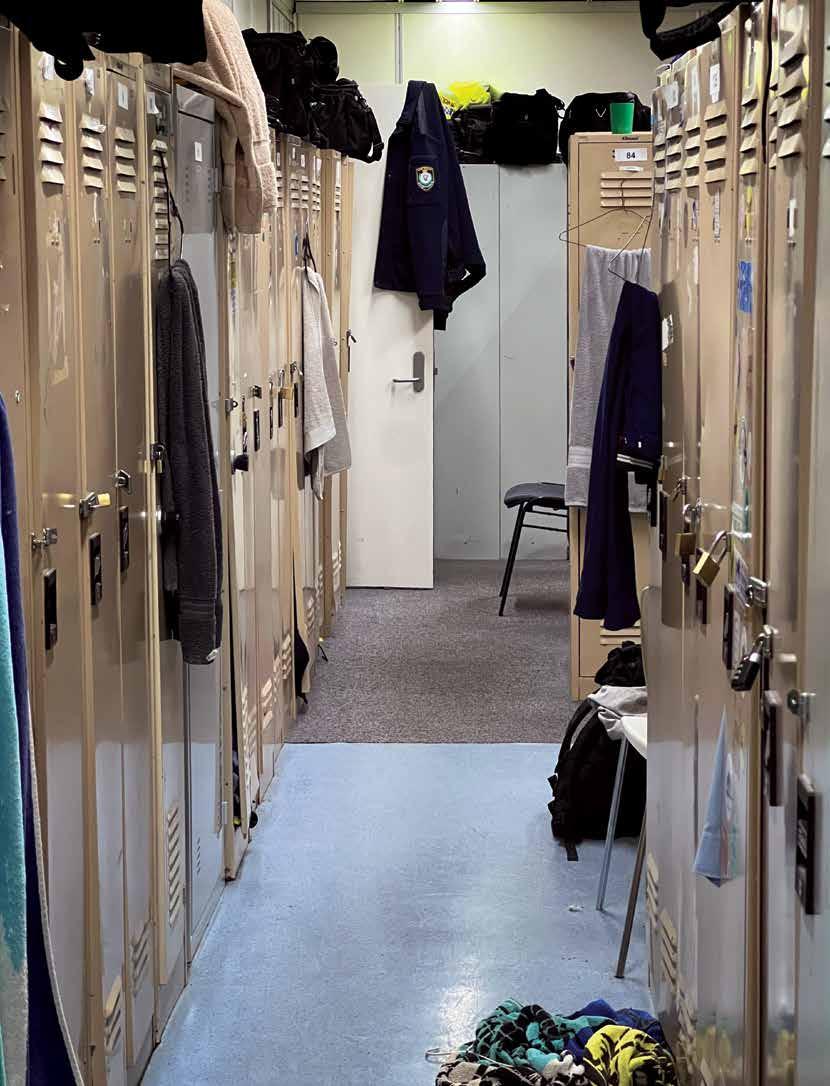
The history, and an officer's experience participating
■ At the 2022 PANSW Biennial Conference, delegates discussed the challenges with staffing experienced when workers are absent from the workplace, ultimately passing a Motion of Urgency. “The CPOB of PANSW directs the Executive of PANSW to negotiate with NSWPF to create a relief pool of available SAP numbers. This relief pool is available to all Commanders to apply for a position within the relief pool to assist with long term absences, with the provision that Commanders replace these SAP positions once vacancies occur within their area. The CPO Branch recommends the PANSW to analyse and review the Victoria Police model to identify key aspects of this proposal that we can approach NSWPF with.”
The PANSW then entered negotiations with the NSWPF to consider an appropriate relief pool concept to assist Commands in replacing shifts when staff were absent. In late 2022, as part of the negotiations for the additional 0.5% that was available for the 2023 Award increase, the concept of the relief pool was drafted between the parties.
The first trial phase of the relief pool commenced in early August 2023 in North West Metropolitan Region (Nepean, Mt Druitt and Blacktown PACs) and Western Region (Chifley and Central West PDs). The second phase commenced in late September 2023, adding Central Metropolitan Region (all PACs) and State Crime Command (Child Abuse Squad) to the trial. If successful, the PANSW will be consulted to establish a further roll out of relief pools across the state.
When asked what she enjoys most about her work, Abbie* has embraced the daily variety that operational policing in a regional town has to offer. She joined

the NSWPF in 2020, after getting a few years of experience in the workforce under her belt in a mix of customer service-based jobs.
“It was always something that I wanted to do but I waited until I had a bit of life experience behind me before I joined.”
“We are first response to absolutely anything, be it car crashes or domestics. The scale is never ending in relation to the jobs we go to, so there is something different every day in General Duties. I really enjoy the teamwork and camaraderie that we have.”
She was introduced to the concept of the relief pool trial while she was on maternity leave. One of the roster officers at her Command reached out to let her know that she was eligible to participate in the new trial and that it was available as an option to utilise. She would get a text message with the roster of shifts that were available and was able to select the options that worked for her.
“You had that flexibility as they would say, ‘These are the shifts available… you pick what you can do.’ You could choose what worked for you and your family, so that was helpful.”
In the lead up to returning to work in January, she was able to utilise the
shifts to get back on top of her training requirements.
“It was beneficial to get my training back on track before I came back to work so that I was operational right away.”
During her time away, several changes occurred within the team at her station. Being able to reintegrate back into the workplace and feel connected while managing the change in lifestyle as a first-time mother smoothed the transition back to work.
“I only did a few shifts prior to returning but it was nice to dip your toes in after spending so long off the truck.”
Like every trial, the relief pool model had its sticky points. The challenges that are regularly faced in general operational policing in relation to the work of following up on jobs are amplified. She doesn’t have an answer for what a fix would look like but was pleased that the structure of her shifts made it easier to lessen the workload burden on her colleagues.
“It is a bit of a double-edged sword. If you’re only coming in for a shift and receive a brief coming out of it, you’re either having to come in on your days off to do that work or you’re having to rely on someone else to follow up on it,” She says.
“Fortunately, I did my shifts just before coming back, so any follow up that I needed to do could be completed in a short time and I could do that myself.”
Abbie’s husband is also a police officer. He is based out of a different command an hour away from their place of residence. If the trial had been available at his Command while he was on parental leave, she was sure that he also would’ve taken it up also.
*Officer’s name has been changed

Fiona Ozols (22-23) and Wes Taylor (23-24) both recieved awards acknowledging their outstanding service at this year's PANSW Biennial Conference
■ Fiona’s first involvement with the PANSW came early on in her career. In her third year in the job, the Constable was involved in a Critical Incident during her time at Ballina in the Northern Rivers. She was guided through the challenging process by then Northern Region Organiser Jon Goddard, who helped her navigate the investigation process along with the Coroners Court.
The challenges she faced opened her eyes to the important benefits of her PANSW membership. Once she was safely out on the other side, she was determined to pay forward the support shown to her during one of the most difficult events of her career.
“At the end of the day, I said to Jon, ‘What do I do? How do I give back… because my membership for the next forty years is not going to pay back what you’ve done for me’. And this is where I came to try and pay it back.” She said.
As Moree Branch Administrator from early 2020 until the end of 2022, Fiona worked to re-invigorate an isolated branch that had long suffered with workload issues and chronic
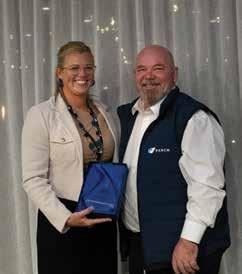
understaffing. She was a driving force in planning and initiating a First Response Dispute in April 2022 which was escalated to the Region Commander then Deputy Commissioner. This ultimately attracted the Commissioner’s attention – leading to high level discussions between CET members and
the PANSW.
A promotion to the rank of Sergeant saw her transfer to Coonamble (where she had previously been a Branch Official) in December 2022. She was elected as Administrator, joining Branch Official Mick Morris on his campaign for essential safety improvements to Coonamble along with Coonabarabran Police Station. This exciting time in her life also saw her give birth to her second child.
During this period, she also lobbied local and Region Commanders for improvements to the incentives to attract officers to regional and remote locations. Her passionate speech about the challenges being faced in the Western Region won the floor at the 2022 Conference and conveyed the issues facing regional police officers were deeply felt and widely held amongst the delegates. This helped pave the way, along with other Association lobbying, for the establishment of the Remote Incentive Committee. During the negotiations, Fiona was a driving force behind the Association’s internal
committee. She was instrumental in the development of the remote incentives policy, including payments to help retain officers already serving in remote and special remote locations.
Western Region Executive Member
Chris Jordan presented Fiona with the Award at the 2024 Conference. He acknowledged her service to the Northern and Western Regions throughout the course of her 13-year career. In her acceptance speech, FIona acknowledged the team that has helped her to reach these significant milestones.
“I could not achieve any of what I have achieved without the people behind me.”
Fiona thanked Chris Jordan, Rod Sheraton, Peter Richardson, Leo
Solomon and other past and present members of the PANSW’s Northern and Western Region teams. Along with her PANSW network, her family including husband Matt and two children along with her Mum and Dad are the major support systems behind her professional success.
“We have an organization here that will stand up and push for the rights of police officers and that to me is something that I need to keep contributing to. Because now more than ever it is so important that we all stand together and keep pushing forward. We need to look after each other and if this is how we do it then that is what we keep doing.”
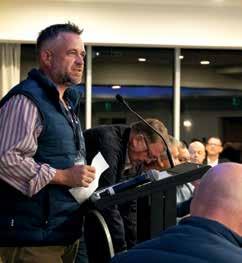
■ PANSW Vice President and former BOOTY winner Ian Allwood presented General Duties Sergeant Wes Taylor with the Branch Official of the Year Award for 2023 – 2024.
"The Police Association could not function without the sacrifice and effort of our Branch Officials. Wes is a selfless volunteer who advocates for his workmates and embodies the PANSW motto of "Strength through Unity." Ian said.
He has been a member of the PANSW for two decades and has been a delegate to Conference on numerous occasions.
As the current Chairperson of the Maitland Branch, Wes' numerous achievements speak to the various issues that Branch Officials face in their volunteer capacity.
He was a key negotiator in implementing Maitland's current First Response Agreement. His evidencebased argument led to gaining a custody assist addition to the FRA for Maitland –an outstanding success.
He has also been a strong advocate for facility upgrades to improve working conditions for members at Maitland. This has included ongoing, hard-fought campaigns to upgrade the charge room, install functional air conditioning and even remove bird faeces from the outside of the building, which was recognised as a health hazard.
Never one to shy away from a challenge, Wes effectively chaired two
Branches at once after staff movements caused his neighbouring branch at Port Stephens to become inactive. He advocated for the Port Stephens Branch to be reactivated before recruiting and advising the new branch officials. When the Aboriginal Legal Service decided not to accept electronic briefs at Port

Stephens, Wes fought to resolve the issue and ensure that police officers wouldn't have to spend two hours on the road delivering the documentation to Newcastle.
Acting as a Branch Official means dedicating countless hours of your personal time to the cause. Wes has
established positive relationships with local members of Parliament to advocate for station upgrades, staffing and other policing issues. He has also acted as a support person for many police officer interviews during Critical Incidents.
During his acceptance speech, Wes said the Maitland Branch deserved all the recognition.
"From the outset…Julianne Randall and I are a pretty solid team. She is just as deserving of this award as I am, and we've stuck together as a Branch, so thank you Julianne."
"Being a Branch Official is a hard gig… it's a great way to win friends and influence people! The Police Association is a wonderful family and there are some very skilled people there that I have had the pleasure of working with. We sort out the battles we fight and try to get the best outcome for our members."
"We're a pretty ordinary building out at Maitland but it is filled with good people."
"I'd like to thank [PANSW Northern 1 Executive Member] Paul Ireland and Ducky (Ian Allwood), who are always on the phone and always pick up."
"I don't do it for myself but for the people I work with to try and get the best results for them. I am truly humbled and sure that many people in this room deserve this award as much as I do."
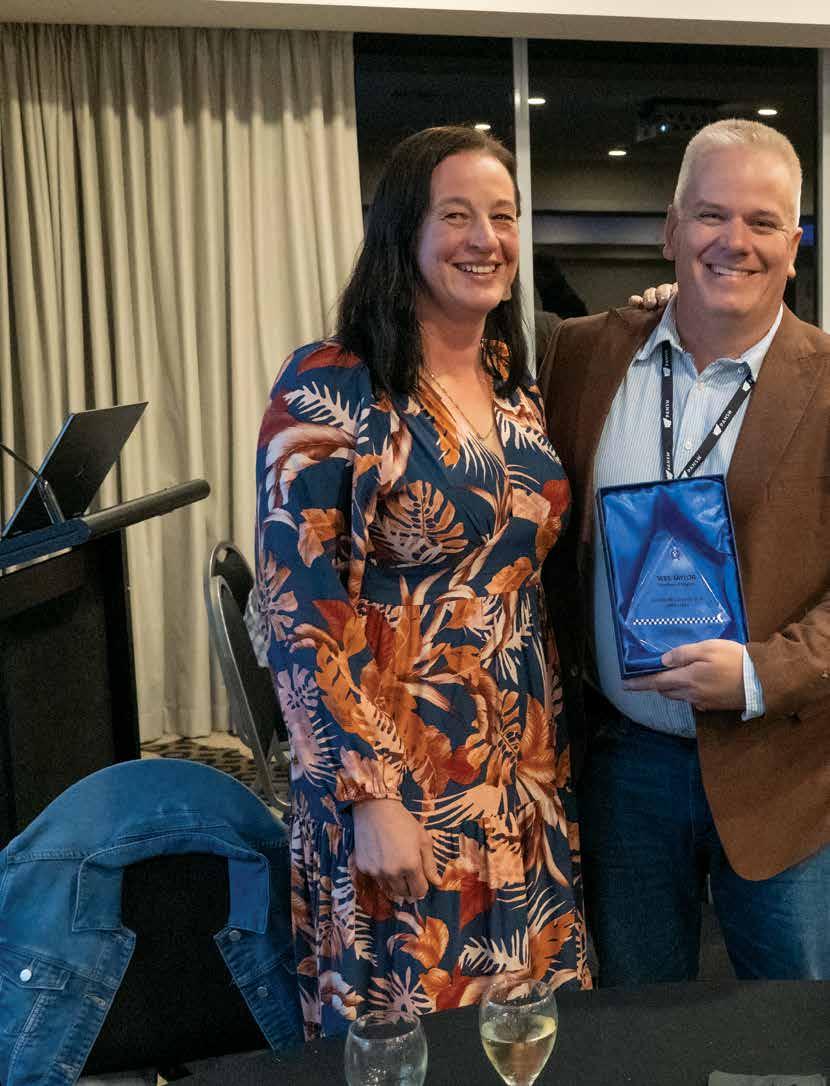
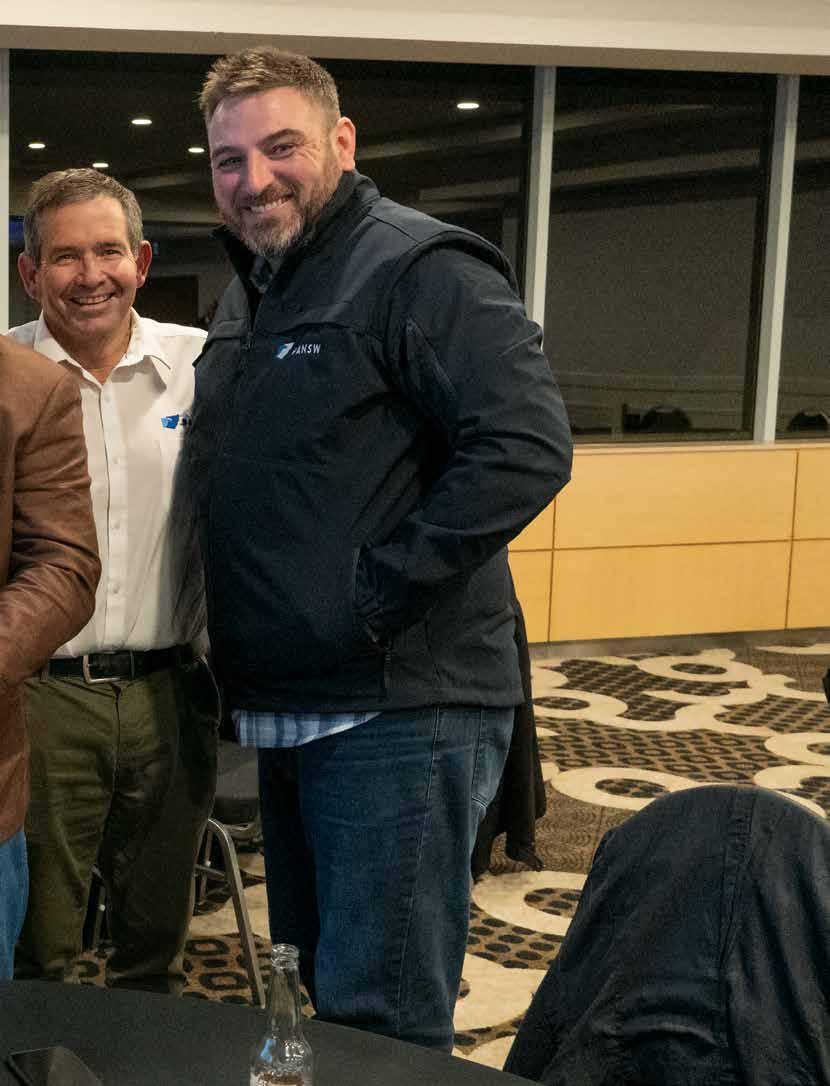
When accepting Branch Official of the year (23-24) Wes Taylor named coworkers and colleagues as key to Maitland branch's success. He articulated what we all know, one person can't whistle a symphony: teamwork is everything. Immediately after speaking Wes returned to his table to share the night's success with mates. PPN interupted to take a photo. Left to right: Julianne Randall, Wes Taylor, Ian Allwood, Paul Ireland.
■
Last year PANSW supported NSW Country Mayors in their call for an enquiry
Police officers all across NSW go to work every day driven by a desire to keep people safe, prevent harm and investigate crime.
With significant understaffing and an ever-increasing demand for police services, it is off the back of the hard work of the men and women of the NSW Police Force that we continue to keep most categories of crime falling or stable.
The hard work of police officers has made the people of NSW safer, with most crime categories stable or falling over the past 20 years. But those trends are mainly driven by crime reductions in metropolitan areas.
Police officers and residents in regional communities have not benefitted from that crime reduction.
The Bureau of Crime Statistics and Research recently reported that in Regional NSW, the rate of property crime was 59% higher than in Sydney, and 57% higher for violent crime.
This disparity of regional crime rates compared to Sydney is long-standing, and the long-term trend is that gap is getting worse not better.
The PANSW joined with representatives from regional communities and called for a Parliamentary inquiry into regional crime.
NSW Parliament listened, and the PANSW put forward extensive recommendations for the Government to help police officers keep regional communities safe.
Police officers are wearing too many uniforms.
Every shift at a police station, officers will be expected to be mental health clinicians, ambulance paramedics, relationship councillors, prison guards, youth workers, workcover investigators, family law solicitors, RSPCA inspectors, national parks and wildlife officers, insurance data collectors, probation and parole officers and so many more jobs that we have inherited over the years.
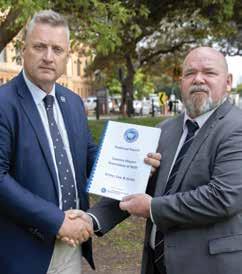
Why in 2024 do police have to drive bail refused prisoners around the state because corrective services cannot pick them up.
Why in 2024 can a local Mental Health team call the local police station and have them check on a patient who is refusing to take his or her medications.
When police officers are asked to do more and more outside their job description, that’s less time for cops to do what cops do best. Spend their shifts on the beat, enforcing the law to keep people safe.
Instead, we have officers spending entire shifts transporting prisoners, or responding to concern for welfare checks. That’s hours that communities are left without their local cops, and help is further away.
No wonder police are burnt out, and no wonder our regional residents are feeling less safe: the inequity of service access is making police officers’ job harder every day.
The PANSW recommended the NSW Parliament:
• ensure Corrective Services perform transport of prisoners who have been bail refused, and
• significantly reduce the number of mental health incidents attended by police, making Health the responsible agency unless a crime is being committed or police are required to address an immediate risk.
Many police officers are interested and committed to serving in regional and remote locations. These places can be an attractive opportunity for many reasons: the professional and personal satisfaction of serving a community of which you are an important part, a new lifestyle and experience, and financial and career incentives.
But despite those attractions, officers cannot take up those opportunities if there is insufficient accommodation and services for the officer to move their life and family.
Housing and childcare are currently two significant barriers to officers taking up that opportunity.
Making great communities across NSW relies on people that are essential (like police, health workers, and teachers) to have a presence in the areas they serve.
If the NSW Government wants to make this a sustainable reality, it needs to ensure essential workers can access the housing and services they need to live in these locations. We should not expect an essential worker making the decision to serve in a regional/rural location is willing to accept poor quality housing, long travel times, or inadequate services needed for their family.
The PANSW recommended the NSW Government:
• provide funding to urgently repair police housing that is of a poor quality,
• develop a central strategy to ensure sufficient housing of suitable quality is
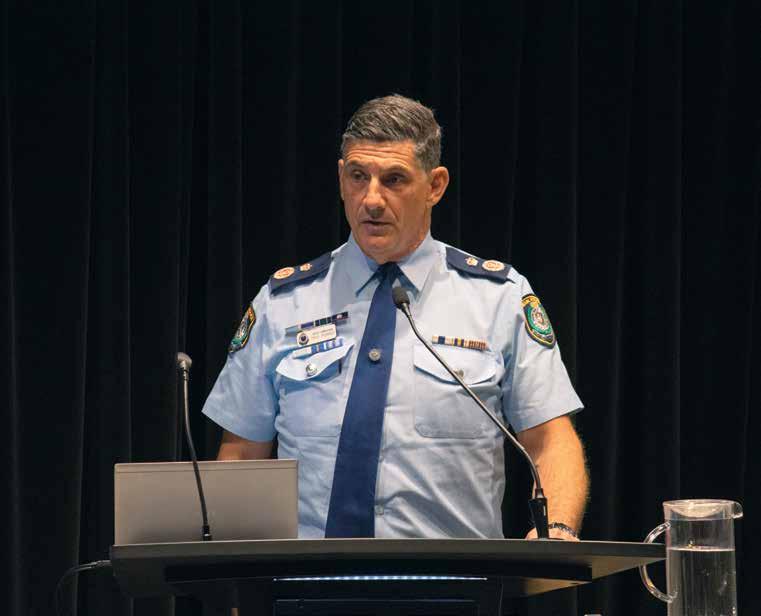
available in all communities to house the key workers required in that location, and
• create priority placements in childcare/ out of school hours care for the children of police officers
Note: The PANSW is also participating in the Parliamentary Inquiry: Essential Worker Housing, and so will be putting forward recommendations in relation to the housing needs of officers in both Regional and Metropolitan locations.
Domestic violence makes up a huge percentage of police workload and is one of the few crime categories that continues to increase.
Every police officer across NSW is responding to domestic violence day in, day out, attending the same house, arresting the same person, putting together a brief of evidence, only to be back there again and again.
Police officers are doing their part: responding to crime, investigating offences, putting offenders before the courts and issuing domestic violence orders.
Police need back up from the judiciary and other services that reduce domestic violence offending and support victims.
The PANSW put forward a strategy to NSW Parliament to achieve this, including:
• Specialized domestic violence court, with
sentencing options and procedures.
• Increased behavioral change programs and related services to stop offenders committing further domestic violence offences.
• Domestic violence cautioning powers so police can require offenders to engage in certain programs and provide a speedier intervention than slow court procedures.
• Family Justice Centers to provide colocation of domestic violence services in one place.
• More devoted domestic violence officers in PACs and PDs to address domestic violence workload.
Aleksandar Boromisa PANSW Industrial Officer
The PANSW often receives enquiries with respect to issues related to the Workers Compensation system and in particular feeling overwhelmed dealing with multiple insurers for their injury/ illness.
Navigating two systems being Workers Compensation and Income Protection with different rules, forms and case managers can be challenging for an injured worker. This is especially complicated with police officers being considered exempt officers under 2012 Workers Compensation changes, where the PANSW secured better conditions to be retained for our members and were exempted from savage cuts to workers compensation by the then NSW Coalition Government.
The article contains a summary of the most frequent issues that our members encounter in workers compensation situations. It is not meant to be an exhaustive guide, nor does it constitute legal advice.
Under the applicable Workers Compensation legislation, the insurer EML is required to commence provisional payments of workers compensation whilst they establish if they will accept liability for the injury/illness. For most police officers, this is a seamless process as the NSWPF continues to pay your wages through the payroll. However, in some circumstances EML may decline to commence provisional payments.
These situations are rare and defined under legislation which include where:
• There is insufficient medical information
• The insurer is unable to contact the worker
• The worker refuses access to the information
• The injury is notified after two months
• The injury is not work related
If you experience a decline of provisional liability, you can make a formal claim for workers compensation
using the prescribed SIRA injury claim form. The insurer must then determine liability within 21 days of having received the completed claim form.
Very often our members will ask whether they have to provide a statement to the insurer or their representative (usually the investigating firm). This can be daunting; however

it is necessary for insurer to determine liability. In some cases, this may be able to be done through the nominated treating doctor or psychologist who may provide a record of their notes. If you are having difficulties with providing a statement, you should raise this with the EML case manager in the first instance.
The payment of treatment services for police officers must be assessed against the claim, based on whether the treatment or service is required as a result of the injury and is considered
reasonably necessary on the provision of properly verified costs.
To claim treatment expenses, the Nominated Treating Doctor (NTD) or treating specialist must submit a request to EML for approval/reimbursement.
This may necessitate the Allied health recovery request (AHRR), updated Workers Compensation Certificate of Capacity and depending on the nature of treatment a report or letter explaining the relationship to the injury and why the treatment is required. The insurer is required to determine requests for medical, hospital and rehabilitation services within 21 days of receipt of the request.
In some cases, the insurer will make a referral for an independent medical examination (IME) subject to the conditions below (see Independent Medical Examination).
If you are having difficulty with obtaining approval or reimbursement, or liability has been declined, you should make early contact with the PANSW Information Organising Centre so we can assist with dealing with the insurer or arranging legal assistance.
The PANSW, with the use of an authority from a member, can liaise on behalf of an injured worker with the insurer which can include querying decisions, clarifying the status of a claim or expense, and seeking further information for the injured worker.
You may claim for domestic assistance where:
• a medical practitioner has certified (based on a functional assessment), that you would benefit from the assistance and the assistance is assessed as reasonably necessary
• you completed these domestic tasks prior to the injury
The domestic assistance should follow a treatment plan your NTD has set up for you. Unfortunately, domestic assistance
is limited for a period of 12 weeks under applicable legislation unless certain thresholds are reached.
The insurer must make a decision regarding liability of your claim for domestic assistance within 21 days.
At times the insurer EML can refer our members for an Independent Medical Examinations. However, as an injured worker you have certain protections.
The legislation prohibits the insurer referring you to an IME unless certain conditions specified within the SIRA Workers Compensation Guidelines are met.
Referral for an IME is appropriate when information from the treating medical practitioner(s) is inadequate, unavailable or inconsistent, and the referrer is unable to resolve the problem directly with the practitioners.
Evidence of contact (or multiple attempts to contact) to try to resolve these issues with the nominated treating practitioner must be documented on the claim file.
An IME is appropriate where the information required relates to:
• diagnosis of an injury reported by the worker
• determining the contribution of work incidents, duties and/or practices to the injury
• whether the need for treatment results from the worker’s injury and is reasonably necessary
• recommendations and/or need for treatment
• capacity for pre-injury duties and hours
• the likelihood of and timeframe for recovery
• capacity for other work/duties (descriptions of such duties are to be provided to the independent medical examiner)
• what past and/or ongoing incapacity
results from the injury
• physical capabilities and any activities that must be avoided
If you have been referred for a medical assessment without those conditions being met, you should raise this with your EML case manager in the first instance. If it is still unresolved, please contact the PANSW immediately. It is important that these matters are addressed prior to your attendance at the IME.
Independent consultants provide independent peer review of allied health practitioner (physical or psychological) treatment in the NSW workers compensation system.
You may be referred to an independent consultant for the following reasons:
• the treatment duration, frequency and/ or whether treatment is reasonably necessary
• treatment that has continued for an extended period without any improvement in functional outcomes, particularly in relation to the worker’s capacity
• the treatment approach most likely to achieve positive work outcomes for the worker
• barriers to recovery at work and/or psychosocial risk factors for delayed recovery and work loss.
A referral for an IMC is generally only on the papers and no attendance is required.
Quite often EML will appoint a rehabilitation provider whose job it is to assist with recover at work plans, retraining, job seeking and similar. This is in addition to what your Injury Management Advisor from the NSWPF does.
As an injured worker you have a right to appoint a rehab coordinator of your own
choice. The PANSW recommends the services of the Workers Health Centre who are affiliated with the PANSW and take an injured worker’s approach to workplace rehabilitation.
What happens if my claim is declined?
The PANSW facilitates a financial legal assistance scheme whereby we will arrange one of our experienced panel solicitors to provide assistance in appealing the decision relating to declined liability or declined medical expenses requests.
Can I claim permanent impairment (s66/67) and continue working?
Members should be aware that if they make a lump sum claim for permanent impairment and pain and suffering under the provisions of the Workers Compensation Act and they are successful; this will most likely cause the NSWPF to refer the officer for an examination of their capacity (either physical or psychological) for full operational duties. This does not mean that you cannot continue working but that an assessment will be carried out whether you are fit to perform your current duties based on the level of permanent impairment claimed.
Where can I get further help with workers compensation issues?
PANSW via (02) 9265 6777 or www. pansw.org.au
Independent Review Office (Complaints against insurers) via phone 139 476 or https://iro.nsw.gov.au/
SIRA (information and resources) via phone 1300 656 919 W: www.sira.nsw. gov.au
Workers Health Centre via phone (02) 97649 7666 W: workershealth.com.au
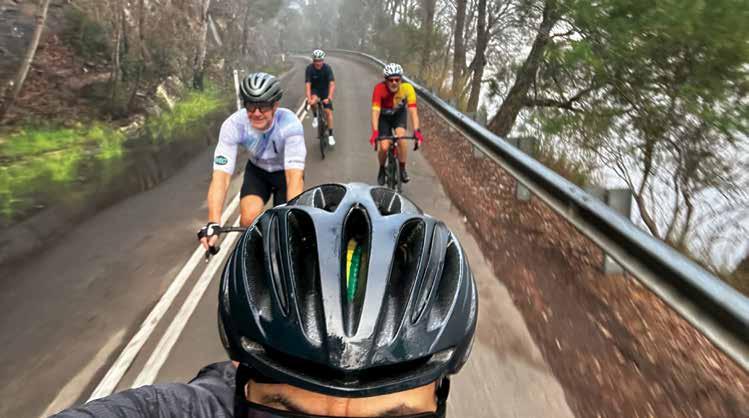
Raff Del Vecchio PANSW Assistant Secretary – Administration
■ The NSW Police Force does an amazing job keeping our families, neighbourhoods and State safe so we can enjoy the lifestyle we have.
Unfortunately, each year front line police officers sacrifice their lives to keep us safe. In addition, there is a terrible growing statistic of depression within the police ranks and officers needing assistance. This loss is not only felt by our community, but also the family and friends of these officers.
NSW Police Legacy steps in and looks after the families/legatees of fallen police officers. Previously, I have had the added privilege and honour of being a director of that wonderful charity and have been on the organising committee of this ride for a number of years. Being on the committee allows me to combine my twin passions of good corporate governance with my love of cycling. This coupled with the amazing people which I have met along the way makes it a highlight for me.
I am again riding the 300kms to honour the memory of a fallen hero Sgt Jason Baker, a school friend and a NSW Police force colleague. He was a fine citizen, a great cop, a great mate and a hero.
The ride will commence 5am from the Domain on 6 September 2024 and we will conclude the ride at the National Police Memorial in the A.C.T. being a distance of just over 300 kms in three days of riding.
This will be my ninth ride. Each has been emotional, strengthening, and wonderful to experience the camaraderie within the peloton as we all reflect together on collective memories of fallen mates. The ride concludes with a service at the National Police Memorial on 08 September 2024.
I am always in awe and inspired by people who push themselves to their physical limit in what is not an easy ride.
The climbs on the back end of day 1 and day 2 are particularly challenging but equally rewarding.
Often these people have had little or no involvement with policing but they get to witness and hear first-hand from the police participants the challenges that front line policing poses. A human face is put to this and they leave the ride with a heightened awareness of the dangers and challenges of policing.
For me it’s about connection with my police community. Giving back to a
profession which has been incredibly good to me. A profession which has provided opportunities and allowed me to come in contact with some of the best humans I have had the pleasure of meeting. People who have become not only work colleagues but lifelong friends. Friends who I know I can count on should challenging times come knocking at my door.
It is three days of laughs, pain, sweat and on occasions tears. It is absolutely a privilege to be involved. To see not only the riders but the support drivers which keep us safe, the legacy staff members and organising committees makes my heart burst with pride that I am part of this special family which is so much more than a profession but a vocation. For those of you thinking of getting involved: do it. I can safely say that you will be rewarded not only from a physical perspective, but you will be enriched by seeing what a special cause it is and what it means to so many.
For me it’s time to hit the road, get some training in and prepare myself for this very special event.







The last round of the ODS scheme brings challenges and opportunities for those exiting, and those staying
In May 2021, the NSW Government Expenditure Review Committee (ERC) approved an allocation of funding for the pilot Optional Disengagement Scheme. The Scheme was funded to run over three financial years and has already successfully refreshed the NSWPF internal ranking structure and promotion base.
Round 3 of ODS opened for Expression of Interests (EOI) on 19 March 2024. This third round of ODS attracted even more interest than previous rounds. The EOI round closed on 22 March 2024, with 821

unaware of the breadth of the skills and experience they develop while being a police officer. Strong communication skills, the ability to solve problems, experience of working within teams, following policies and procedures, understand compliance obligations and the ability to make decisions, are a few examples of some of the transferable skills our ODS officers may be leaving with.
Importantly not all officers who expressed an interest in the ODS were able to be offered an exit in this final round, due to the funding limitations. Officers who are interested in a career change within or away from NSWPF are encouraged to consider other options.
• In accordance with the Capability Development and Rotation Policy, officers may actively seek rotational opportunities to enhance professionalism, development, skills and knowledge in alternate roles. Rotational Opportunities and Commands In Focus are published under Promotions, Vacancies, Transfers and Mobility.
• People & Capability Command have various Capability Development Programs that are designed to support you throughout your career plan pathway.
• The Talent & Careers Team, People and Capability Command in collaboration with Technology & Communication Services Command have developed in interactive career pathways tool ‘Career Pathfinder’. The tool is easy to navigate and can be used to generate a personalised career plan matched to your capabilities, skills, and interests, whilst also identifying areas for development. You can also explore the various roles, levels and how they are connected across NSWPF.
EOIs submitted.
The officers had different years of service ranging from 10 years up to 49 years of service. It is an exciting time for these officers who now move towards a new career path, the majority of these officers have already engaged with the career transition provider for support. Some will have ongoing meetings with their career coach, working on personal branding, strengthening interview skills and some may just seek out assistance with their resume and gaining an understanding of their transferable skills. Surprisingly our NSWPF officers are often
• The NSWPF is committed to supporting officers in their career development and encourages officers to utilise the internal resources and networks available in career planning and development.
People and Capability Command provides guidance, resources and training that can assist with identifying, planning, and reaching future career goals. As a result of ODS, vacancies will be created, as such officers may wish to consider career opportunities as they become available. Information on lateral and promotional vacancies can be found on the Police Vacancies intranet page.
• Officers are encouraged to utilise all available internal resources such as the Careers, Education & Development (nsw.gov.au) intranet pages.
• There are organisations who focus on providing support and services particularly for individuals who have worked on the frontline.
• The above is not an exhaustive list of career support services or options. Officers may benefit from conducting their own research and may elect to engage with services that meet their individual requirements.
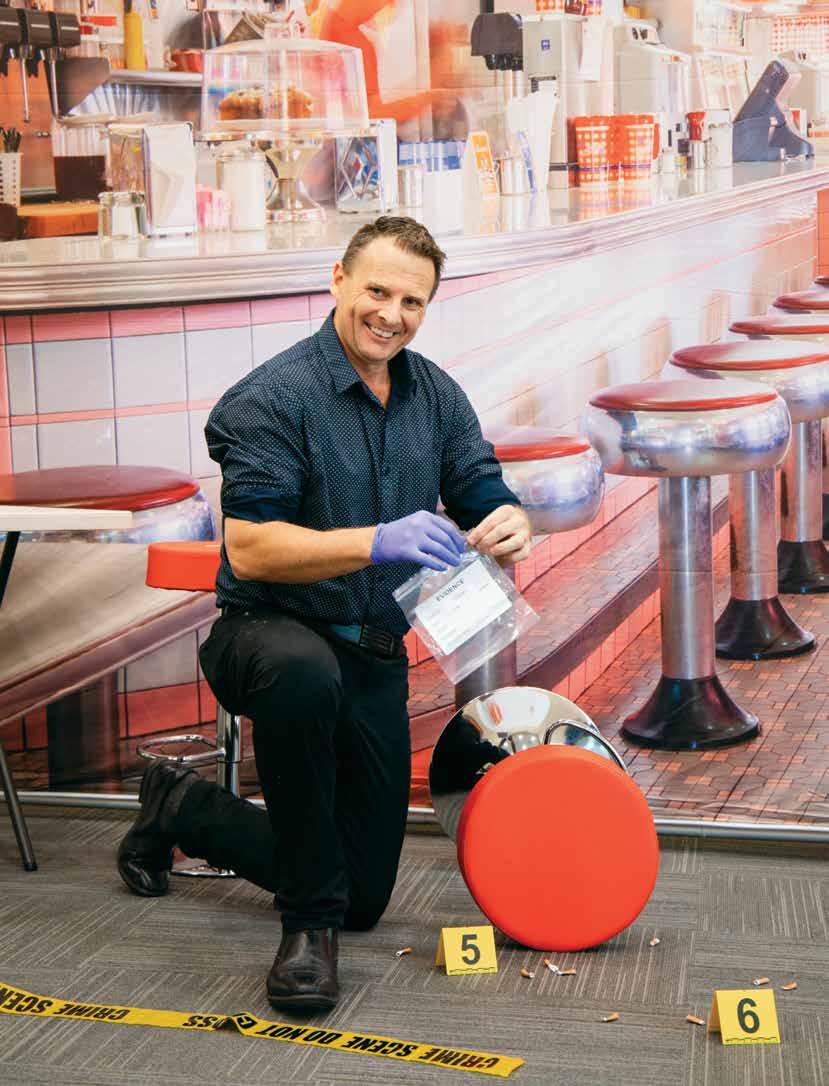
Mick Timms PPN Writer
Role-play learning worked well in the cops, Luke wondered could it work for kids?
■ Luke and Brenda Taylor are former police officers and PANSW associate members. Today, they run Crime Story, a one-day workshop for school students which uses a mock crime scene to engage with high school students.
After leaving NSWPF and reinventing himself as a school teacher, Luke became concerned about literacy standards. He felt students lacked engagement with what and how they were being taught.
“I remembered experiencing similar levels of ineffective professional development as a police officer, with the exception of role play-based learning,” Luke told PANSW Police News
“The most effective teaching instruction I have received was in the ‘mock battle’ of a paintball game of Simunition (training using service firearms converted to fire paintball projectiles). This experience allowed an active, curious, creative, pleasurable, joyful, and meaningful experience – which is easily recalled many years later – as we worked individually and in teams, searching and clearing rooms and challenging suspects and civilians."
Luke asked himself if this framework could be applied to high school learning.

As head of English at a north coast school, Luke started by having students make a video game as project-based learning. The classroom was a bank, with a getaway car parked nearby.
“The class had to consider where they would decamp, writing the methods as we go,” Luke said.
During COVID, Luke would teach in front of the camera and run crime scenarios online. With remote learning he had many parents at home watching online as well as students.
“Parents told me I should take this further,” Luke said.
“Crime Story makes students think and gives them the skills to look for details. Once they know how to do that, they can apply that to other aspects of their education.
Students sift through evidence, using authentic crime scene analysis equipment to dust for fingerprints, take DNA samples, and interview witnesses.
“We build relationships with our students very quickly. By morning recess, we are getting some hard-hitting questions,” Luke said.
Brenda is an integral part of the program.
“Working and being married has challenges but we know each other so well. The female students connect with her so it’s not just a male voice,” Luke said.
“We have different backgrounds so we can identify with students from different backgrounds.
Luke and Brenda deliver Crime Story throughout the state. They have been featured on national news and current affairs programs which can be viewed via their website, www.crimestory.com.au.
■ Luke Taylor joined NSWPF in 1995, serving at Blacktown and Cabramatta before specialising in child protection as a Detective with State Crime Command. He was also a PANSW delegate for many years before leaving the job in 2009.
The now 50-year-old is upfront about his struggle with mental health and PTSD and life after policing. “I used to think there wasn’t anything outside of the police,” Luke told PANSW Police News “It’s difficult, letting yourself go. It’s hard recognising when you’re ready to move on. At one stage, I would deliver newspapers just to acknowledge that I
could work. I would slowly increase into other areas, but I was hiding. “I got to a point where I needed to do something for my own mental health, so I started studying a Bachelor of Arts in literature by distance education. I’d read that teaching degrees had been discounted so I jumped into that.
“I studied literature, poetry writing, Shakespeare, and the University wanted to know why I hadn’t done the teaching subjects which were required for the discount.
Having done so much work towards his degree, Luke started teaching,
later obtaining Master of Arts. “I had a supportive school and principal who understood PTSD and the issues I was dealing with. My GP was also very supportive,” Luke said.
“But after several years teaching, I started having mental health problems."
Luke required in-patient treatment and didn’t want to lose another career. “I got back on track and my daughter told me to back myself and have a go at developing Crime Story,” Luke said. “I’ve been able to embrace the good things about being a detective and a police officer.”

Sonia Roberts PPN Writer
Sydney's Eastern Suburbs Cemetery gets a Police Memorial Wall honouring fallen Officers
■ Following the establishment of the Woronora Cemetery Police Memorial, the late Mr. John Douglas Morrison OAM, Chairman of the Board of the Eastern Suburbs Memorial Park (2005-2012) was concerned about families of officers who had lost their lives whilst on duty. It was deemed important to honour and remember our police officers killed whilst working in the Eastern Suburbs since 1862.
Retired Sergeant Ron Alexander, the Service Co-ordinator for the National Police Remembrance Day at Woronora since 2019 and ongoing, recalled Mr Morrison’s motivation in advocating for the Eastern Suburbs Cemetery Police Memorial Wall. “He was a retired Chief Inspector (NSW Police), Deputy Mayor (1985/86) and Mayor of the Municipality of Waverley (1986/87)."
The process involved in establishing the Eastern Suburbs Cemetery Police Memorial Wall was streamlined, as it replicated the layout of the successful Woronora Cemetery Police Memorial submission to the major stakeholders.
“Although both memorial sites are similar in that there are four vertical granite plates displaying the fallen police officers’ names, the police ode, a dedication to the first National Police Remembrance Day Service (29 September 1989) and an inscription to Saint Michael patron saint to police officers, this is where the similarities end."
“The Woronora site has two large garden beds with concrete borders. One bed enables the interment of ash remains to be placed in that particular garden, with a bronze plaque affixed to the border adjacent to the ash remains."
“The other garden bed enables bronze
plaques to be affixed to the concrete border where no ash remains are interred. All bronze plaques, following approval, display the name and rank of the fallen police officer, with the blue and white checked band and NSW police emblem, if requested by the family."
“Due to the design and layout of the Eastern Suburbs Cemetery Police Memorial Wall, there is no similar interment of ashes or bronze plaque laying facility available at the Eastern Suburbs Cemetery Police Memorial Wall,” Ron said.
There are 27 fallen police officers’ names mounted on a granite wall, while four colonial troopers’ names are mounted in granite seats.
Three services have been held at the Eastern Suburbs Police Memorial Wall starting with a commemoration service by then NSW Police Force Commissioner Andrew Scipione APM on December 2, 2015.
A memorial service was held in 2017 marking the 30th anniversary of the death of Probationary Constable Themelis (Tim) Arthur Macarounas in 1987.
On November 30, 2020, Ron was the Master of Ceremonies for the Tribute Memorial Ceremony in honour of Mr John D. Morrison OAM.
As no organising committee had been established since the wall was commemorated, there were no regular annual memorial services held between 2015 and 2022.
Due to the significance of the Eastern Suburbs Cemetery Police Memorial Wall
and the little activity of regular memorial services being held there, as Chairman of the Woronora Cemetery Police Memorial Service Committee, he was tasked by the then Southern Metropolitan Cemetery Trust to assemble a police memorial service organising committee at the Eastern Suburbs, similar to what was occurring at Woronora Memorial Park since 2015.
After contacting many stakeholders Ron found interest in establishing an organising committee began to develop. “In March 2022, I convened and chaired a pilot organising committee which was made up of the Commander, Eastern Beaches PAC, NSW Police Chaplaincy, NSW Police Protocol, Retired Former Police Association (RFPA) members, staff from the Eastern Suburbs Memorial Park and Woronora police memorial committee members,” he said.
Ron undertook to chair the committee for 12 months and in April 2022, an organising committee was formed.
The first annual memorial service, held on October 21 2022, paid tribute to Constable Dana Therese Heffernan killed at Randwick in April 1987.
In 2023, Ron handed the chairmanship to Paul Wynne, President of the RFPA. The 2023 service included a tribute to Constable Mark Postma, who died in February 1987.
The Eastern Suburbs Cemetery Police Memorial wall is located within the north-western area off Morrison Way (south-west of the administration building). The memorial walls and grounds are maintained by dedicated staff at Eastern Suburbs Memorial Parks.
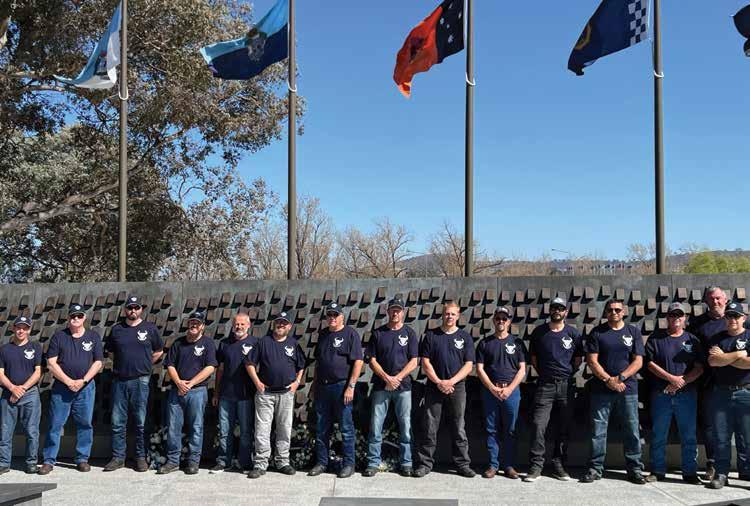
Mick Timms PPN Writer
With the 2024 Wall to Wall Ride for Remembrance rapidly approaching, PANSW Associate Member Mal Unicomb looks back on last year’s ride.
■ Last winter, Coonabarabran identity and retired Senior Sergeant Mal Unicomb APM was mapping out his sixth Wall to Wall Ride. He was planning to ride his trusty Honda from Coonabarabran to Canberra, but things didn’t quite go as planned. “In the lead up to the event I had a total knee replacement and just didn’t have enough mobility to safely ride my bike,” Mal explained.
“However, I was fortunate enough to be invited to ride along in a vehicle driven by our Volunteer Rescue Association (VRA) support staff. Our group of riders were proudly supported by our VRA who are always there to assist and support Police and our frontline partners."
Like others from interstate or regional NSW, Mal’s group didn’t converge on Sydney’s Domain on the Saturday morning but took a scenic route to
Canberra. “We had 18 people in our group,” Mal explained. “Over half were serving or retired officers, the rest of the group consisting of representatives from VRA and RFS as well as police family and friends."
On the morning of Friday 15 September 2023, Mal’s group assembled in front of Coonabarabran Police Station and set off on their four-day trip. “We travelled to Merriwa, Sandy Hollow, Rylstone and on to Bathurst where we stayed on Friday night,” Mal said. “On Saturday morning we headed south to Crookwell, Goulburn, and finally to Canberra."
Mal told PANSW Police News that the highlights were the gathering at the National Memorial Wall in Canberra, and “travelling through some beautiful Australian country”.
“Our return journey took us to Nowra
then through Kangaroo Valley and finally into Penrith,” Mal said. “Our group stopped at Bulga village on the return journey and enjoyed a great Australian pastime, a sausage sandwich cooked on the barbecue."
To those doing the Wall to Wall ride this year, Mal reiterates the importance of planning, and safe group riding, as highlighted by an incident which affected his trip home in 2023. “On the Monday we travelled via the Putty Road and arrived home at 5.30pm in the afternoon after having to take a threehour diversion due to a serious crash that closed the Golden Highway for several hours.
We look forward to seeing Mal back in the saddle in September for this year’s Wall to Wall ride. Safe riding!
Detective Inspector Paul Quigg
■ Across country NSW, Aboriginal and Indigenous school children live and breathe for rugby league. As one school student involved in the ‘Sticks to Stadium’ program put it, “rugby league is our heart and soul”.
This fierce passion for the game is shown at the highest level – with Indigenous people accounting for only two per cent of the country’s population but a massive 11 percent of the NRL’s players. This is a huge statistic for Aboriginal and Indigenous athletes. The aim of the Sticks To Stadium program is to increase the percentage of Aboriginal and Indigenous youth making it to the required NRL level. We want to ensure these school children and youth can fulfil their dreams not only on the sporting field but in their school studies and progressing their careers after school whether it be commencing an apprenticeship, studying at university, TAFE or getting a job.
The Manning-Great Lakes Police District in partnership with Forster Public School and Forster High School provided the opportunity of a lifetime for eleven school students from the two schools to be a part of the Penrith Panthers Rugby League ‘Sticks to Stadium’ program between 31 May and 2 June 2024.
Penrith Panthers Rugby League Club proudly supported the Aboriginal youth from the Manning Great Lakes Police District involved in this valuable program. Participation is used as a reward for good behaviour and attendance at school. The positive social and cultural experiences is transformative for the school children that made the journey to the Penrith Panthers Rugby League Academy and learnt what it takes to be a NRL player under the Penrith Panthers Rugby League program.
Before arriving at Penrith, the school students attended the NSW Rugby League Centre of Excellence at Sydney Olympic Park. The school students were shown through the NSW Rugby League Centre of Excellence by NSW Rugby League CEO David Trodden. The tour included a group photograph in the NSW
State of Origin dressing room before Game One on 5 June 2024. The students then spent time at BOUNCE Homebush (an activity that was sponsored by Tobwabba Aboriginal Medical Service).
After arriving at the Penrith Panthers Rugby League Academy, the students met former NRL player Glen Liddiard. He

is now the Penrith Panthers Aboriginal & Indigenous Welfare Officer. As a proud Biripi man whose family came from Dingo Forest near Wingham, Glen outlined his background to the kids before describing how education is building a strong Aboriginal culture within the Penrith Panthers Rugby League Football Club. He also spoke about the importance of attending school and obtaining a good education, making the right choices in life, as well as being a good role model on and off the field.
Glen showed the students through the Penrith Panthers Rugby League NRL facilities and outlined what it takes to be a NRL player, the sacrifices you must make to succeed at a first grade NRL level, such as dedication, maintaining good nutrition and looking after your sporting injuries through recovery and rehabilitation programs.
On Saturday, 1 June 2024, the school students went to Sydney Zoo at Eastern Creek before attending the NRL game between the Penrith Panthers and St
George Illawarra Dragons at BlueBet Stadium in Penrith. The kids were invited into the inner sanctum on game day before kick-off and interacted with the Penrith Panthers players afterwards.
On Sunday, 2 June 2024, the students returned to Forster after an exciting a few days in Sydney which taught them a lot about making the right choices in life. The comments from some of the school students were priceless. One student said about the program, “This rugby league program has changed my life.” Another one of the students said the program was the best experience that he had ever been involved with and he learnt a lot about being a better person and staying out of trouble.
In summing up the ‘Sticks to Stadium’ program, there is no doubt this program was designed to develop Aboriginal youth in our community to make the right choices and not being easily led. I believe we have achieved this goal from the feedback obtained from the school students as well as their outstanding behaviour throughout the trip.
The students received high praise from Glen Liddiard and several other senior staff members from Penrith Panthers Rugby League Club and NSWRL CEO David Trodden. This program set the foundation for these students to achieve their goals in life and not giving up when the going gets tough.
I would like to finish with a quote from the wall of the Penrith Panthers Rugby League Academy, “Success is the sum of small efforts repeated daily – Don’t let fear, failure or setbacks get in the way.”
Thanks to the following people who made this trip which a success: NSWRL CEO David Trodden, Glen Liddiard, Mariah Broadbridge, Tiffany Serra, Isabelle Hughes, Alex Reilly, and the other staff from the Penrith Panthers Rugby League Football Club. Sergeant Brad Durham, Senior Constable Leonie Durham, Constable Brodi Hughes attached to Forster Police Station, Kevin O’Neill from Taree PCYC, Hertz Car Rental and Tobwabba Aboriginal Medical Service.
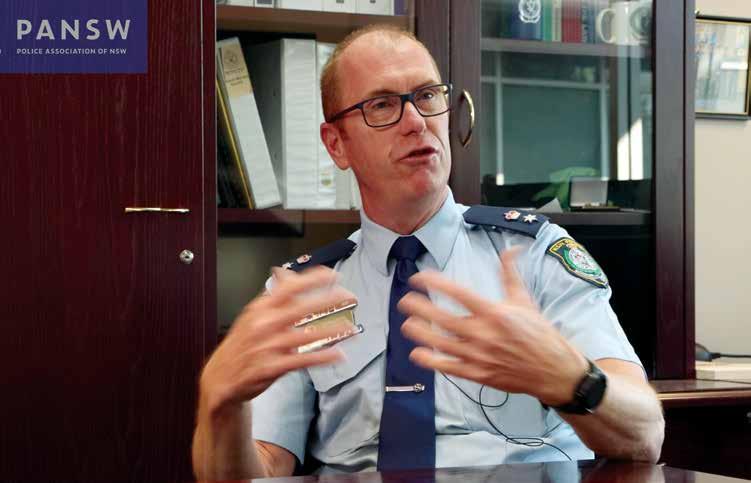
PANSW Manager Engagement Angus Skinner sat down with Superintendent Brendan Gorman and PANSW Research Officer Dr. Kate Linklater to discuss the concept of the relief pool trial.
AS: One thing that is helping police commands and individual officers both in regional and metropolitan [areas] is the relief pool. For those of us who aren’t aware, what is the relief pool?
BG: People that are on long term leave, like extended leave, paternity leave or maternity leave... we can use them to fill shifts and shortfalls. For us, it's been a lifesaver.
We get the roster sorted, and we know where the holes are straight up from General Duties in First Response. So we can get in touch with those people that have expressed an interest to be part of this relief pool and say, ‘These are the [shifts]...which ones can you do?’ One officer had 14 weeks off on paternity leave and did 20 shifts for us. Court, briefs, training...all that kind of stuff was able to keep moving through.
AS: Your research covered this issue extensively. What were the high-level lessons?
KL: My research was into perceptions and experiences of diversity and inclusion in NSWPF. What came out of that... is that when people are off for a long period of time or they’re part time, so maternity, part time paternity...we found that the officers who were still in the station doing the work felt that they were picking up the slack, and it was felt that was the officers who were off...it was their fault, in a way, but that that's how it was perceived. From that, we sort of troubleshooted a couple of different recommendations about how we could move forward with it and one of those was this relief pool where if we can fill that gap where people are no longer feeling that they need to pick up the slack, it should, in theory, affect the
inclusion for the people who are off.
When we look at it more broadly, there are so many other benefits to it. The person who's off is getting paid for that extra work. If we've got people off on long term [leave], it's a good wellbeing thing for them to be connected back into the workplace if they want to come back in.

To watch the full 11 minute video scan this QR code (above), or go to https://www.pansw.org.au/ knowledgebase/article/KA-01368
Solution, page one

1. Plant that has green leaves all the year round. (9)
2. A chemical used to destroy plants, especially weeds. (9)
3. A plant that grows and dies within one year. (6)
4. A chemical mixture spread on the ground to assist plant growth. (10)
5. A tool with a long handle and a small square blade, used to break up the surface of soil. (3)
8. A chemical element easily lost from soil. Symbol N, Atomic No. 7. (8)
10. A method of growing plants without soil, instead uses nutrients rich water. (10)
11. A source of cheap labour for agriculture: known for their luggage. (11)
12. A dark vegetable: the main ingredient of Borscht. (8)
17. A plant that competes with your preferred plants. (4)
19. Grows in clusters. Can be eaten raw, made into wine, or dried. (6)
21. Trim branches so a plant will grow better the next year. (5)
22. The artificial application of water to land to assist in crop production. (10)
23. Orange with green shoots. Grows mostly underground. (6)
25. Family of beans and peas, excellent for protein, and replacing nitrogen to soil. (7)
27. Season which follows winter. (6)
28. Tree that loses leaves in the autumn. (9)
29. Popeye’s favourite vegetable. (7)
31. A fungi you can eat (sometimes). (8)
6. A red, rotund, fruit, often thought of as a vegetable. (6)
7. A plant that grows up or over things. (4)
9. A plant that grows and lives across several years. (9)
13. A frame built to support climbing plants. (7)
14. A chemical used to destroy insects. (9)
15. Wood chips and organic material (maybe asbestos) spread on ground to protect plants. (5)
think Spring
16. A mix of decayed organic waste used in the soil to help plants grow. (7)
17. A small cart with one wheel and handles. (11)
18. The planned cultivation of an area of plants, trees, and grasses. (9)
20. A glass building in which plants are cultivated. (10)
23. Cultivated plants harvested in large quantities. (5)
24. An approach to land management. The name combines ‘permanent’ and ‘agriculture’. (12)
26. The small, hard part of a plant from which a new plant grows. (4)
27. A young plant grown from a seed. (9)
30. All the plant life in a particular region or epoch. (5)
32. Animal waste you spread in order to make plants grow better. (6)
33. A plant cutting inserted into the stem of a living plant, from which it will receive sap. (5)








